Filter by
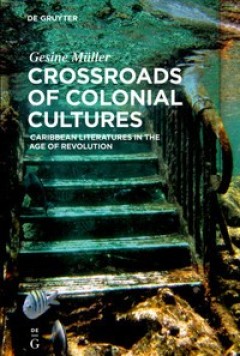
Crossroads of Colonial Cultures : Caribbean Literatures in the Age of Revolution
The study examines cultural effects of various colonial systems of government in the Spanish- and French-speaking Caribbean in a little investigated period of transition: from the French Revolution to the abolition of slavery in Cuba (1789–1886). The comparison of cultural transfer processes by means of literary production from and about the Caribbean, embedded in a broader context of the cir…
- Edition
- -
- ISBN/ISSN
- 9783110495416
- Collation
- 367 halaman
- Series Title
- -
- Call Number
- 900 MUL c
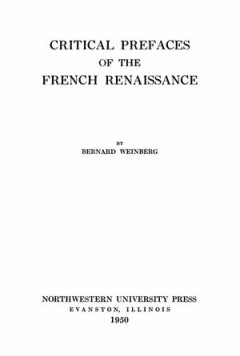
Critical Prefaces of the French Renaissance
Critical Prefaces of the French Renaissance contains nearly 30 prefaces from the works of French poets and dramatists published from 1525 to 1611. Bernard Weinberg’s helpful book collects prefaces from the works of satirical poets, as well as dramatists, and provides a short introduction to each preface setting it in its literary and historical context. Lyrical and satirical poets represented…
- Edition
- -
- ISBN/ISSN
- 9780810138773
- Collation
- 304 halaman
- Series Title
- -
- Call Number
- 800 WEI c
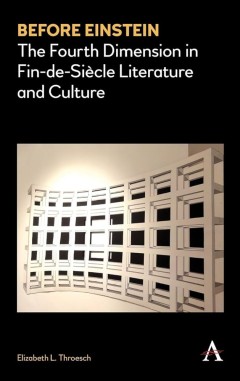
Before Einstein : The Fourth Dimension in Fin-de-Siècle in Literature and Cu…
Before Albert Einstein proposed the concept of four-dimensional spacetime, late Victorian scientists, radical philosophers and writers were discussing the possibility of a different kind of fourth dimension. Before Einstein offers the first book-length examination of the impact of pre-Relativity four-dimensional theory on literature and culture at the turn of the twentieth century.
- Edition
- -
- ISBN/ISSN
- 9781783086238
- Collation
- 222 halaman
- Series Title
- Anthem Nineteenth-Century Series
- Call Number
- 800 THR b
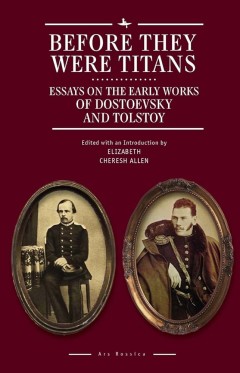
Before They Were Titans : Essays on the Early Works of Dostoevsky and Tolstoy
Dostoevsky and Tolstoy are the titans of Russian literature. As mature artists, they led very different lives and wrote vastly different works, but their early lives and writings display provocative kinships, while also indicating the divergent paths the two authors would take en route to literary greatness. The ten new critical essays here, written by leading specialists in nineteenth-century …
- Edition
- -
- ISBN/ISSN
- 9781618116833
- Collation
- -
- Series Title
- -
- Call Number
- 800 ALL b
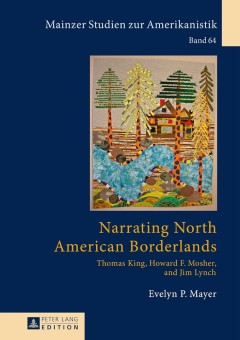
Narrating North American Borderlands : Thomas King, Howard F. Mosher and Jim …
The study centers on the presentation of the North American borderlands in the works of Canadian Native writer Thomas King’s Truth & Bright Water (1999), American writer Howard Frank Mosher’s On Kingdom Mountain (2007), and American writer Jim Lynch’s Border Songs (2009). The three authors describe the peoples and places in the northeastern, middle and northwestern border regions of the U…
- Edition
- -
- ISBN/ISSN
- 9783653983531
- Collation
- 227 halaman
- Series Title
- Mainzer Studien zur Amerikanistik, 64
- Call Number
- 800 MAY n
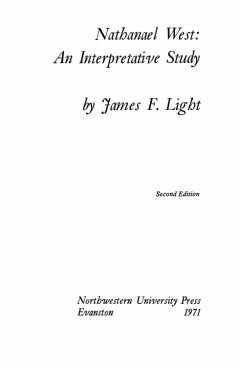
Nathanael West : An Interpretive Study
This study of the novels of Nathanael West begins with the important threads of West’s life and their relationship to his works. James F. Light gives a detailed analysis of each of West’s novels, investigating in particular the works’ treatment of social criticism and manipulation of dream and symbol.
- Edition
- -
- ISBN/ISSN
- 9780810139664
- Collation
- -
- Series Title
- -
- Call Number
- 800 LIG n
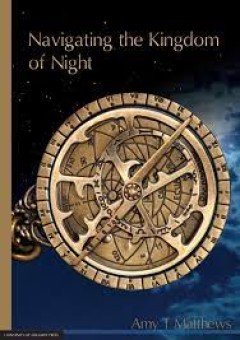
Navigating the Kingdom of Night
In 2011, Amy T Matthews published End of the Night Girl, a novel which engages creatively with questions of identity politics and the ethics of fictionalising the Holocaust. Navigating the Kingdom of Night is a critical exegesis in which the author contextualises End of the Night Girl in terms of the critical debate surrounding Holocaust fiction.
- Edition
- -
- ISBN/ISSN
- 9781922064585
- Collation
- 170 halaman
- Series Title
- -
- Call Number
- 800 MAT n
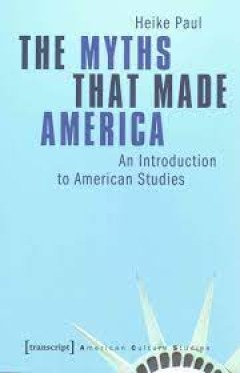
The Myths That Made America : An Introduction to American Studies
This essential introduction to American studies examines the core foundational myths upon which the nation is based and which still determine discussions of US-American identities today. These myths include the myth of »discovery,« the Pocahontas myth, the myth of the Promised Land, the myth of the Founding Fathers, the melting pot myth, the myth of the West, and the myth of the self-made…
- Edition
- -
- ISBN/ISSN
- 9783837614855
- Collation
- 456 halaman
- Series Title
- American Culture Studies
- Call Number
- 900 PAU m
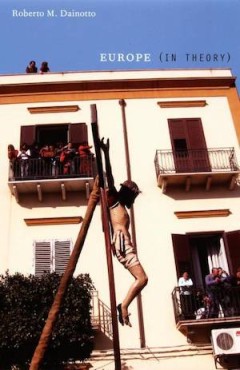
Europe (in theory)
Europe (in Theory) is an innovative analysis of eighteenth- and nineteenth-century ideas about Europe that continue to inform thinking about culture, politics, and identity today. Drawing on insights from subaltern and postcolonial studies, Roberto M. Dainotto deconstructs imperialism not from the so-called periphery but from within Europe itself. He proposes a genealogy of Eurocentrism that ac…
- Edition
- -
- ISBN/ISSN
- 9781478091417
- Collation
- 288 halaman
- Series Title
- -
- Call Number
- 800 DAI e
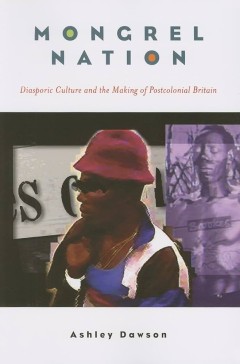
Mongrel Nation : Diasporic Culture and the Making of Postcolonial Britain
Mongrel Nation surveys the history of the United Kingdom's African, Asian, and Caribbean populations from 1948 to the present, working at the juncture of cultural studies, literary criticism, and postcolonial theory. Ashley Dawson argues that during the past fifty years Asian and black intellectuals from Sam Selvon to Zadie Smith have continually challenged the United Kingdom's exclusionary def…
- Edition
- -
- ISBN/ISSN
- 9780472099917
- Collation
- -
- Series Title
- -
- Call Number
- 900 DAW m
 Computer Science, Information & General Works
Computer Science, Information & General Works  Philosophy & Psychology
Philosophy & Psychology  Religion
Religion  Social Sciences
Social Sciences  Language
Language  Pure Science
Pure Science  Applied Sciences
Applied Sciences  Art & Recreation
Art & Recreation  Literature
Literature  History & Geography
History & Geography